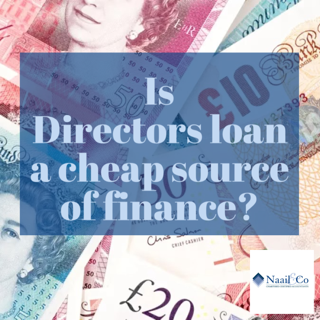Is Director's loan a cheap source of finance?
Is borrowing from a personal or family company as director’s loan an attractive source of cheap finance?
HMRC has long tried to discourage director shareholders from borrowing money from their companies through a special tax, known as an s 455 charge. The reason being that HMRC considers the borrowing may be a technique to avoid either PAYE, NIC (payable if the ‘loan’ was paid as salary or bonus) or dividend tax. However, borrowing from your company could prove less costly than borrowing from a bank, so long as the rules are adhered to and the company is not in financial difficulty.
Impact if directors loan is not re-paid
A full-time working director with more than 5% interest in the company’s share capital and an overdrawn director’s loan account (DLA) as at the accounting year end is required to repay that amount before the company’s corporation tax is due (nine months and one day after the year end). If the loan is not satisfied either by direct repayment, dividend or write off, the company is liable to an additional tax charge of 33.75% of the amount (for 2022/23).
In addition, should the total of all outstanding loans exceed £10,000 at any time during a tax year, the director may also be required to pay additional tax and National Insurance contributions (NIC) under the benefit in kind rules. The charge will be on the difference between interest payable at the ‘official rate’ and any interest paid by the director; the company will also be required to pay Employer’s Class 1A NIC on the charge.
The benefit charge can be avoided if interest equal to the ‘official rate’ is paid. The interest rate is lower than borrowing via an unsecured bank loan; however, the company will have to pay corporation tax on the interest received.
Tax payable under s 455 is a temporary tax, repayable to the company by HMRC nine months and one day after the end of the accounting period in which the loan is repaid. The overall tax effect is therefore nil, although the time lag between the loan being repaid and the refund can place a strain on a company’s cash flow.
Impact if directors loan not repaid on time
If directors loan is not repaid on time and the company is not in the position to pay a dividend or bonus, changing the company’s financial period could be something to consider. Changing the period end to a date before the money was borrowed means that the s 455 charge is further deferred as no loan would have been made as at that (revised) accounting period end.
Example
Mark is a director of his own company, whose financial year end is 30 September. In August 2021, Mark borrowed £20,000 from the company. So that the section 455 charge does not kick in, the loan needs to be repaid by 1 July 2022. In May 2022, Mark realised that he would not be able to repay the money by the due date and the company did not have enough cash to pay a dividend or bonus to cover the debt. If the company shortens its 2021 financial year to 31 July 2021, Mark would not have borrowed the money as at that date, so section 455 charge will not apply.
However, the charge will apply if the loan is not repaid by 1 May 2023. The downside of this shortening of the accounting period is that it brings forward the date of payment of the company’s corporation tax bill, so this will have to be factored into the decision. It is advised that this delaying technique should be kept to a minimum.
Practical tip
As ever with any tax planning, it may not always be beneficial to clear the loan if it triggers more tax and NIC than charged under s 455. It may be preferable to pay the tax and clear the loan at a later date where this can be done with little or no associated tax implications.

Related pages:
Get further information from the following pages;
Related Blogs:
Get further information from the following blogs;
Tax tip: Different categories of shares
Compulsory liquidation costs to rise
Am I liable for the new Plastic Packaging Tax PPT
Small businesses to file P&L accounts at Companies House
EU blocks minimum corporate tax deal
Late tax payment interest rate raised to 2.75%
Crackdown on directors who dissolve companies to evade debts
Extended loss carry back rules
Tax on subsidised workplace meals
Our service to you
If you are a self employed, business owner/director of company looking to get your accountancy and taxation matters sorted, look no further. We, at Naail & Co, are pro-active and easily accessible accountants and tax advisors, who will not only ensure that all your filing obligations are up to date with Companies House and HMRC, but also you do not pay a penny more in taxes than you have to. We work on a fixed fee basis and provide same day response to all your phone and email enquiries. We will also allocate a designated accounts manager who would have better understanding of your and business financial and taxation affairs. Book a free consultation call using the link below.
Subscribe to our newsletter
BUSINESS HOURS
Monday – Friday
- 9:00 am – 5:30 pm
Pages:
Menu








